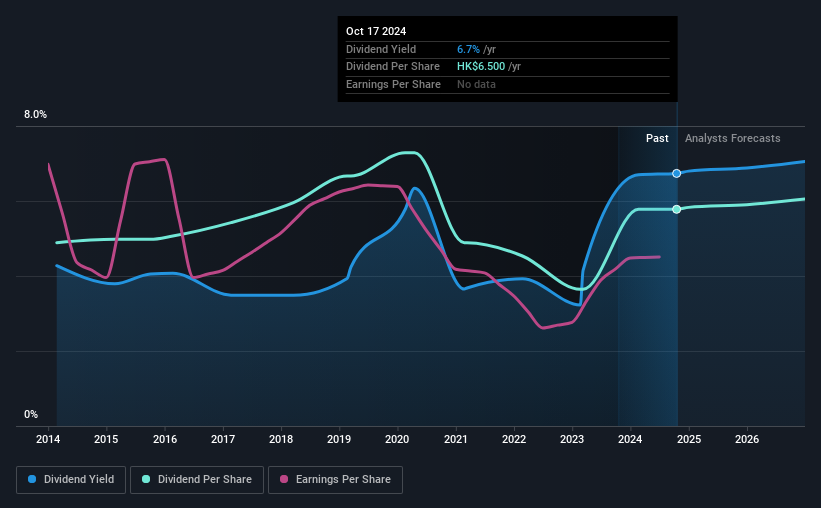Dividend Investors: Don't Be Too Quick To Buy Hang Seng Bank Limited (HKG:11) For Its Upcoming Dividend
Readers hoping to buy Hang Seng Bank Limited (HKG:11) for its dividend will need to make their move shortly, as the stock is about to trade ex-dividend. Typically, the ex-dividend date is one business day before the record date which is the date on which a company determines the shareholders eligible to receive a dividend. The ex-dividend date is important because any transaction on a stock needs to have been settled before the record date in order to be eligible for a dividend. Accordingly, Hang Seng Bank investors that purchase the stock on or after the 22nd of October will not receive the dividend, which will be paid on the 12th of November.
The company's next dividend payment will be HK$1.20 per share, and in the last 12 months, the company paid a total of HK$6.50 per share. Looking at the last 12 months of distributions, Hang Seng Bank has a trailing yield of approximately 6.7% on its current stock price of HK$96.50. Dividends are an important source of income to many shareholders, but the health of the business is crucial to maintaining those dividends. We need to see whether the dividend is covered by earnings and if it's growing.
Check out our latest analysis for Hang Seng Bank
Dividends are usually paid out of company profits, so if a company pays out more than it earned then its dividend is usually at greater risk of being cut. Hang Seng Bank paid out 74% of its earnings to investors last year, a normal payout level for most businesses.
Companies that pay out less in dividends than they earn in profits generally have more sustainable dividends. The lower the payout ratio, the more wiggle room the business has before it could be forced to cut the dividend.
Click here to see the company's payout ratio, plus analyst estimates of its future dividends.

Have Earnings And Dividends Been Growing?
Companies with falling earnings are riskier for dividend shareholders. If business enters a downturn and the dividend is cut, the company could see its value fall precipitously. Readers will understand then, why we're concerned to see Hang Seng Bank's earnings per share have dropped 6.0% a year over the past five years. When earnings per share fall, the maximum amount of dividends that can be paid also falls.
Many investors will assess a company's dividend performance by evaluating how much the dividend payments have changed over time. In the past 10 years, Hang Seng Bank has increased its dividend at approximately 1.7% a year on average.
To Sum It Up
Has Hang Seng Bank got what it takes to maintain its dividend payments? Earnings per share have been declining and the company is paying out more than half its profits to shareholders; not an enticing combination. All things considered, we're not optimistic about its dividend prospects, and would be inclined to leave it on the shelf for now.
Although, if you're still interested in Hang Seng Bank and want to know more, you'll find it very useful to know what risks this stock faces. For example - Hang Seng Bank has 1 warning sign we think you should be aware of.
A common investing mistake is buying the first interesting stock you see. Here you can find a full list of high-yield dividend stocks.
Have feedback on this article? Concerned about the content? Get in touch with us directly. Alternatively, email editorial-team (at) simplywallst.com.
This article by Simply Wall St is general in nature. We provide commentary based on historical data and analyst forecasts only using an unbiased methodology and our articles are not intended to be financial advice. It does not constitute a recommendation to buy or sell any stock, and does not take account of your objectives, or your financial situation. We aim to bring you long-term focused analysis driven by fundamental data. Note that our analysis may not factor in the latest price-sensitive company announcements or qualitative material. Simply Wall St has no position in any stocks mentioned.
 Index Options
Index Options CME Group
CME Group Nasdaq
Nasdaq Cboe
Cboe TradingView
TradingView Wall Street Journal
Wall Street Journal